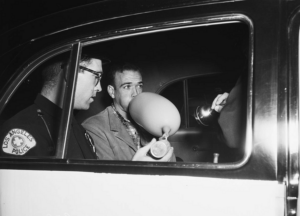Breath test machines are widely used by law enforcement to measure the amount of alcohol in a person’s body. They’ve been around for many decades, dating back to 1931’s “Drunkometer.” These devices have certainly improved over the last 90 years, but they’re still not perfect by any means. In fact, there are several reasons that a breath alcohol test might not be nearly as accurate as you may think.
These machines work by measuring the amount of alcohol in a person’s breath. When you drink, alcohol is absorbed into your bloodstream. This alcohol intermixes with breath in your lungs, where some of it is further absorbed into your breath. When you exhale, small amounts of alcohol are then exhaled too. By measuring this breath alcohol, the amount of alcohol in your blood can be determined. The general rule is that a ratio of 2100:1 is used, meaning that for every gram of alcohol in your breath, 2100 grams of alcohol will be present in your blood.
Factors Affecting the Accuracy of Breath Test Machines
- Calibration and maintenance: These machines require regular calibration and maintenance to ensure they’re working properly. If these tasks are not performed on schedule as required, the accuracy of the device can be compromised.
- Biological variations: Everybody is different, and everyone’s bodies handle alcohol differently. Factors such as weight, gender, age, and health conditions can all impact how we metabolize alcohol. For instance, a higher body temperature tends to produce higher alcohol readings. Certain medical conditions, such as diabetes, can also impact the accuracy of a breath test.
- Mouth alcohol: When we drink, we’re actually consuming relatively small amounts of alcohol. And very little of this alcohol actually makes it into our breath. Even if someone is highly intoxicated, the amount of alcohol in their breath is very small. Therefore, breath test machines are testing for very, very small amounts of alcohol. The machine then uses that 2100:1 ratio to multiply the amount of breath alcohol to determine their blood alcohol. If someone has recently consumed an alcoholic beverage, some of that alcohol will remain inside their mouth for a period of time. If any of that beverage gets exhaled into the machine, the test results will be raised significantly. Even a tiny amount of such a beverage contains enough alcohol to significantly impact the result of a breath test. This can also happen even if someone has not recently consumed alcohol, but it is reintroduced into their mouth by burping or vomiting.
- Environmental Factors: External factors can also impact a breath test. Paint fumes, gasoline, or some cleaning products can produce interference that makes breath test readings unreliable. Radio waves, such as from police radios and other electronic devices, can also cause issues that lead to inaccurate results.
- Software and hardware issues: If you’ve ever experienced a computer crash or other technical difficulties, you know that complicated machines are not always reliable. Breath test machines are no different. Software glitches and hardware malfunctions can all occur and cause incorrect test results.
- Operator error: Not just anyone can administer a breath test. There is a certification process and only tests administered by certified operators are admissible in court, at least in Minnesota. Beyond just certification, there are standard procedures that must be followed when running the breath test machine. Failure to follow these procedures can result in inaccurate test results.
Conclusion
Breath alcohol tests are quick and convenient, especially compared to other testing methods such as blood or urine testing. But they are not foolproof. They are complex machines that require rigorous maintenance and correct operation in order to be reliable. Given the serious consequences of a DWI, it’s important that people be aware of the flaws in these machines and recognize their limitations. This is an area where a skilled and experienced criminal defense attorney can make a big difference. You’re probably not familiar with the science behind these machines or the procedures necessary to ensure a reliable and accurate test, but we are! If you’ve been charged with a DWI offense, contact us to learn more about how we can help.



